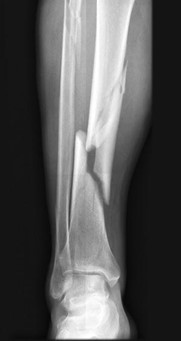A nurse is assessing a client who is in skeletal traction for a fractured left tibia. The nurse should identify that which of the following findings indicates altered tissue perfusion of the affected extremity?
Pain with movement of the left great toe
Faint pedal pulse of left leg
Warm skin temperature distal to pin site
Purulent drainage at the pin site
The Correct Answer is B
Choice A reason:
Pain with movement of the left great toe is incorrect finding: Pain may be expected in a client with a fractured left tibia, especially if the great toe is moved. Pain is more related to the fracture and may not specifically indicate altered tissue perfusion.
Choice B reason:
Faint pedal pulse of the left leg is correct because it indicates that the blood flow to the foot is diminished. The pedal pulse is the pulse felt on the top of the foot, and its faintness could suggest reduced arterial blood flow to the foot.
Choice C reason:
Warm skin temperature distal to the pin site is incorrect: Warm skin distal to the pin site may indicate adequate blood flow and could be a normal finding. Warmth is generally associated with increased blood flow to the area.
Choice D reason:
Purulent drainage at the pin site is incorrect. Purulent drainage at the pin site could indicate an infection, but it is not directly related to altered tissue perfusion. Infection can lead to complications, but it does not necessarily indicate reduced blood flow to the extremity

Nursing Test Bank
Naxlex Comprehensive Predictor Exams
Related Questions
Correct Answer is A
Explanation
A. "We can expect the hospice nurse to provide support for us after our mother's death." This statement indicates that the family understands that hospice care includes bereavement services for up to one year after the death of a loved one.
B. "A hospice nurse will come to the house each time our mother needs pain medication." This statement indicates that the family does not understand that hospice care involves teaching them how to administer pain medication and other comfort measures to their mother at home.
C. "Now that my mother is receiving hospice services, we will not be able to get respite care." This statement indicates that the family does not understand that hospice care offers respite care, which allows them to take a break from caregiving for a short period of time.
D. "Hospice care focuses on arranging treatment that will prolong our mother's life." This statement indicates that the family does not understand that hospice care focuses on providing palliative care, which aims to relieve pain and suffering, rather than curative treatment, which aims to extend life.
Correct Answer is C
Explanation
A. Incorrect. The nurse should assess the client's IV site every hour to prevent infection and phlebitis.
B. Incorrect. The nurse should check the client's WBC count every day to monitor for signs of infection or bone marrow suppression.
C. Correct. The nurse should monitor the client's mouth every 8 hr for signs of oral candidiasis, which is a common fungal infection in immunosuppressed clients.
D. Incorrect. The nurse should change the client's IV tubing every 24 hr to reduce the risk of bacterial contamination.
Whether you are a student looking to ace your exams or a practicing nurse seeking to enhance your expertise , our nursing education contents will empower you with the confidence and competence to make a difference in the lives of patients and become a respected leader in the healthcare field.
Visit Naxlex, invest in your future and unlock endless possibilities with our unparalleled nursing education contents today
Report Wrong Answer on the Current Question
Do you disagree with the answer? If yes, what is your expected answer? Explain.
Kindly be descriptive with the issue you are facing.
